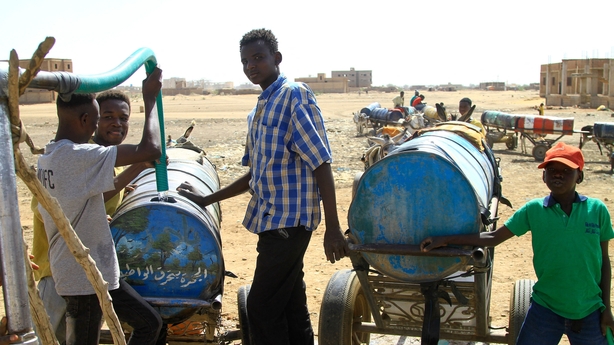At night, Tarteil Omar prays that they make it through, knowing that her house could be one of those hit.
Over the past week, she has observed explosions around Khartoum, Sudan's capital, from her bedroom window.
On Sunday, her neighbour was killed when she became the latest victim of shelling that wiped out her home.
Ms Omar had hoped that there would be some respite today, given a supposed ceasefire brokered by the United States.
She and her family are hoping to flee the city. But reports of gunfire and explosions across Khartoum have complicated those efforts.
"There’s still fighting going on," Ms Omar, a 19-year-old medical student, told RTÉ News.
As foreign governments work to evacuate their citizens from the city, many Sudanese people feel they have been forgotten, as they struggle through constant black-outs and food shortages.
Even before the hostilities, Sudan was one of Africa's poorest and most volatile countries.
"I fear for my life and I can’t even reach or get hold of my family or my friends. And the situation just keeps getting worse and worse," Ms Omar said.
She is trapped at home with her parents as fighting continues unabated in the city.

Late yesterday, US Secretary of State Antony Blinken announced that the warring parties - two army generals who appear set on all-out war - had agreed to a 72-hour nationwide ceasefire.
By this morning, it was clear that the agreement was flimsier than many had hoped.
The conflict has its origins in the 2019 toppling of Omar al-Bashir, a dictator who had ruled for nearly 30 years.
The military led the country in conjunction with civilian leaders until 2021, when the two generals - Abdel Fattah al-Burhan and Mohamed Hamdan - took control of the country in a military coup.
In the process, two long-time rivals apparently became steadfast partners. And both of them had ostensibly been in favour of a transition to democracy and civilian rule.
That partnership appeared to unravel in recent months. Gen Hamdan, who leads the army’s paramilitary wing, feared that his forces were being sidelined. And he soon began to position himself as someone who could lead the country.
For ordinary citizens, the consequences have been harrowing. Since the fighting began on 15 April, over 450 people have been killed and thousands injured.
Shops across the city have been closed. Many have been looted of valuable goods and food supplies.
"Even if you want to go outside to get some of the stuff that you need, you would most likely get shot," Ms Omar said.
Ms Omar said that the paramilitary wing led by Gen Hamdan, known as the Rapid Support Forces, or RSF, has made it very difficult to leave the city.
"Even if you were to flee, there have been multiple incidents of them getting robbed or hijacked by the RSF," she said.
"It’s just scary."






